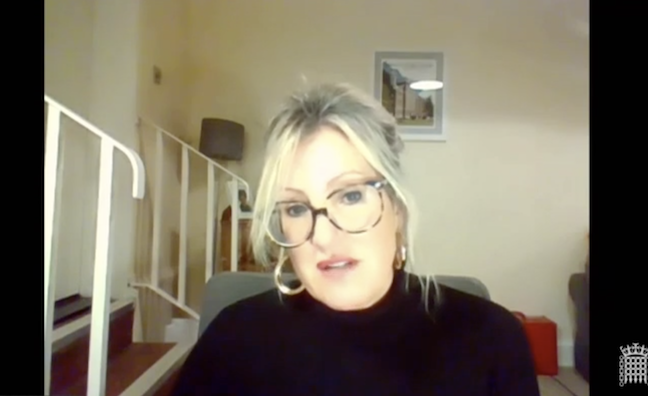Culture Minister Caroline Dinenage has responded to the Parliamentary debate on the petition for visa-free touring across the EU, which was signed by 284,069 people.
The petition was set up by freelance camera director Tim Brennan after it emerged that touring artists were not part of the post-Brexit EU trade agreement. The campaign received a boost when high-profile artists including Elton John, Ronan Keating and Radiohead’s Colin Greenwood made urgent calls for the government to support artists.
During the Petition Committee debate, MPs raised key issues on the impasse with the EU over visa-free touring, as well as the intervention by Elton John.
Kevin Brennan suggested that the issue had been “shunted into the irrelevant sidings of post-Brexit immigration policy”.
David Warburton raised the issue of cabotage limits on the size of trucks, which “makes conventional touring impossible”. He called for an exemption on cabotage and visa waivers for artists.
“The music industry must be mobile – it’s crucial for its success,” he said.
Labour frontbench spokesperson Alison McGovern said it’s an issue “that it simply isn’t an issue that is going away”.
However, MPs and artists may be disappointed by the Culture Minister’s response, despite her outward show of support for the sector.
“The support and the media attention generated by this e-petition just demonstrates how touring is not solely important to the cultural and creative economy, and those who work in it, but it also highlights the UK’s passion for these sectors; how vital they are for our entertainment and our enjoyment, but also our emotional and mental health, and wellbeing, our sense of collective enjoyment and togetherness at a time when so many of us are separated from friends and family,” said Dinenage. “We all look forward desperately to their full return following the pandemic.”
Insisting that the negotiating team on the EU trade deal had understood the issues for the sector, Dinenage said: “The government fully understands and recognises the importance of touring for UK musicians and other cultural professionals.”
Our door remains 100% open, there is scope to return to this issue in the future if the EU should change its mind, and we would welcome it with open arms
Caroline Dinenage
She added: “They [the negotiating team] are fully aware of the financial implications for this significant sector on this being hindered. That’s why… the UK pushed for ambitious arrangements for performers and artists to be able to work across Europe after the end of freedom of movement – of course we did, because they are so vital to our economy.
“Our proposals were very straightforward: they involved capturing the work done by musicians, by artists, by entertainers and their accompanying staff, through the list of permitted activities for short-term business visitors. This would have meant performers and artists could have worked and travelled in the EU more easily, and would mean that there were no requirements for work permits either.”
Stressing that the proposal was developed in consultation with industry experts, including the Musicians’ Union, Dinenage once again blamed the EU (despite MPs urging her not to do so ahead of her comments).
“Quite simply, the EU rejected this proposal,” she told MPs. “There was no specific counter-offer from the EU concerning touring for musicians, or for the creative sectors.”
Dinenage said the issue of “ad hoc performances” was in other areas of the trade deal negotiation, where the EU tabled text on paid activities possible without a visa.
But she then revealed the government’s main concern: the EU proposals were part of a package of visa-free travel for current and future EU members across a wide range of sectors.
“It’s just simply not consistent with the manifesto commitment to take back control of our borders, and it wasn’t consistent with the idea of Brexit that the majority of people in this country voted for,” said Dinenage.
“This isn’t a blame game, the outcome of the negotiations is deeply regrettable for all our sectors. It’s not the deal that DCMS or the government wanted, and it’s not the deal that the negotiators pushed for…. Our door remains 100% open, there is scope to return to this issue in the future if the EU should change its mind, and we would welcome it with open arms.”
Just a year ago, Dinenage’s predecessor in the role said freedom of movement was “essential” for artists in the EU.
While Dinenage rejected the petition, she attempted to flag up some positives, including the visa-free option for UK artists for up to 90 days in countries including France. EU artists visiting the UK can play at certain permit-free festivals without a visa for six months (although the example of Glastonbury was not that helpful in a year in which it's been cancelled due to Covid-19).
“The UK’s offer to touring professionals is more generous than many of the EU member states,” she added. “It is absolutely within the gift of each member state to improve their own arrangements if they want to encourage a more vibrant and welcoming arrangement in their country.
“As a government, we will engage with bilateral partners to find ways to make life easier for those working in the creative industries in countries across the EU.”
Dinenage stressed that “worrying” issues such as cabotage would be addressed, while a DCMS-led working group has started work to help the sector with guidance and support, as well as moving towards bilateral engagement with EU countries.
But without a full return to the negotiating table with the EU, those 284,069 people who signed the petition will not have their concerns addressed by the government for the foreseeable future.
Click here to read artist manager Ross Patel on the EU touring row.












